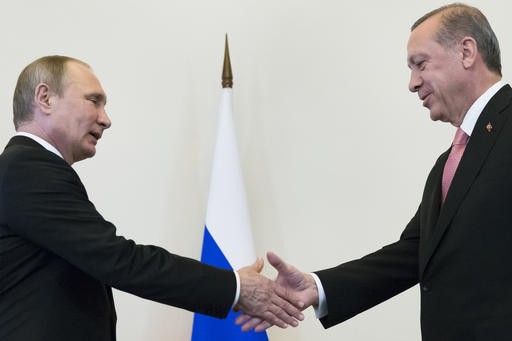Popular Reads
Top Results
Can't find what you're looking for?
View all search resultsPopular Reads
Top Results
Can't find what you're looking for?
View all search resultsCOMMENTARY: Everyman for himself in a post-American world
Writing in 1987, international relations scholar Paul Kennedy said in his seminal book The Rise and Fall of the Great Powers: Economic Change and Military Conflict from 1500 to 2000 that it was too early to write an obituary for the domination of the United States through the Pax Americana order that it created.
Change text size
Gift Premium Articles
to Anyone
Writing in 1987, international relations scholar Paul Kennedy said in his seminal book The Rise and Fall of the Great Powers: Economic Change and Military Conflict from 1500 to 2000 that it was too early to write an obituary for the domination of the United States through the Pax Americana order that it created.
More than two decades later, that prognostication appears too optimistic. If in the next one or two decades, Pax Americana finally goes the way Pax Britannica did in the first half of the 20th century, we can look back to today as its watershed moment. There has rarely been a moment in the past 50 years when America has had so little power to manage global security and the global economy.
This week, Russia, Iran and Turkey met in Moscow, of all places, to find a political solution to end the six-year war in Syria. Missing from the negotiation table is United States Secretary of State John Kerry, whose diplomatic work in the region had been stymied by President Barack Obama’s reluctance to get into another entanglement in the Middle East.
Also this week, we witnessed America’s reduced capacity to deal with an ascendant power. American allies in Asia were baffled by the Obama administration’s inability to devise a strong response toward China’s move to seize an underwater drone operated by American sailors in the international waters in the South China Sea, about 80 kilometers from the Philippines. Observers have said that such inaction indicated diminished American authority in the region.
But nothing humiliates America more than the fact that this once mighty superpower is now vulnerable enough that a foreign power could interfere in its elections and if the accusation is true, the meddling did in fact change the result of the 2016 presidential election. The picture is now getting clearer that the hacking operation aimed at hurting the candidacy of Hillary Clinton was personally directed by Russian President Vladimir Putin, who held a grudge against the Democratic candidate for challenging the legitimacy of his leadership when she served as secretary of state.
It used to be that it was the CIA that had the capacity to launch covert operations to influence the results of elections in countries like Chile, Iran, or Guatemala. Now, the CIA could only report on the alleged hacking to influence the US election and could do little to stop it.
Russian meddling is a double whammy for the US. The election of Donald Trump has jeopardized the values that America has promoted for the past 60 years. Trump’s insistence on running his business while serving as president and filling his cabinet with billionaires and military generals has forced many to question if America has in fact turned into a banana republic. We know that America has been gradually on the decline, “but the election of Donald Trump feels like a sudden plunge” an op-ed contributor wrote in the New York Times last week.
But if you think the abovementioned facts are anecdotal, consider this. Today, America is basically a rentier economy after reaching its peak as a manufacturing powerhouse in the 1960s. The Financial Times reported in 2012 that 58 percent of total income in America now comes from dividends and interest payments, while China continues to become the world’s largest manufacturing economy. Somebody should tell Trump that manufacturing jobs will stay in China and will not return to places like Ohio, Michigan, or North Carolina. America’s deindustrialization is irreversible and he should live with that.
Economically, America today is a pale shadow of its former self. By the end of World War II, the US share of world gross domestic product (GDP) was nearly 50 percent, but in 2015 the figure shrank to 16 percent.
Superpowers come and go. It is the natural cycle in world politics. Every major power in the world has seen their moment in the sun before being ushered into the dustbin of history. Major powers like Spain, Britain, Germany, Austro-Hungary and Japan ascended to the top and then experienced decline, sometimes precipitated by violent conflagration.
In his research for his book, Kennedy found that the great wars between 1500 and 1945 happened in connection with changes in the economic capacity of rising and declining great powers. Today, however, we should not be concerned that another world war is imminent because the advent of nuclear weapons with their destructive capacity will prevent great powers from resorting to violence in solving conflicts, Kennedy writes.
With major conflict unlikely, what should nations do to further their interests? What should a middle power like Indonesia or allies of America in Southeast Asia do in a post-American world? Did President Joko “Jokowi” Widodo, Malaysian Prime Minister Najib Razak and Philippines President Rodrigo Duterte make the right decision to build a closer alliance with China?
In a post-hegemonic world, the principles of self-help should guide the behavior of nations, Robert Keohane proposes in After Hegemony. Everyone should be a realist in such a world, where rules are set by the most powerful nations and less powerful countries play a bandwagoning role. America is on the wane and China is ascending and smart leaders know where the wind is blowing. It’s every man for himself now.










